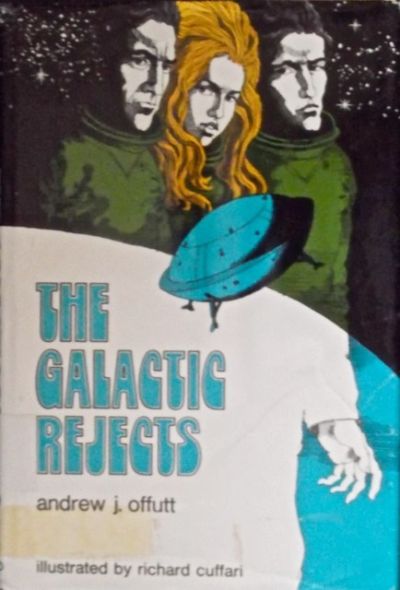A Thing of Shreds and Patches
The Galactic Rejects
By Andrew J. Offutt

26 Jul, 2020
Andrew J. Offutt’s 1973 The Galactic Rejects is a standalone SF novel.
The starship Brunner, having been ambushed by the alien Azuli, is doomed. The crew of the Brunner, hoping to prevent panic, assure their passengers that there enough spacepods for all. This is a lie, but it doesn’t convince the telepath Rinegar. He commandeers a spacepod and escapes.
The spacepod lands on the nearest world, which just happens to be conveniently habitable. The pod can’t take off again; Rinegar is marooned. With him are two strangers, fellow veterans of the Terran-Azuli war: flighty teen Corisande and twenty-something delinquent Berneson.
Like Rinegar, Corisande and Berneson have awesome psychic powers. Corisande is skilled at telekinesis and Berneson can teleport. The trio do not care for each other, but they must cooperate to survive.
They soon discover that the world on which they are marooned is inhabited by people indistinguishable from Earth humans. Those folks call their world Bor (which means “world”). To the Earthlings’ surprise, the locals are neither surprised nor concerned that three strangers have suddenly appeared. When the trio claim to be from another world, this is accepted without much interest in the matter of aliens or starflight.
At first glance, Bor seems to be much like Earth in the late 19thcentury or early 20th. This initial impression proves false. Progress on peaceful Bor hasn’t been driven by war, but there is progress, nevertheless. The biological sciences are quite advanced; physics and engineering not so much.
The three humans have few skills useful on a world like Bor (they were all trained for the Azuli-human war). They end up joining a carnival, where they can use their secret powers in their acts. The money is OK, and they are as happy as they could be under the circumstances. There is no reason they could not enjoy long, peaceful lives on bucolic Bor.
It turns out that there is a reason. It was no coincidence that the starship Brunner was attacked by an Azuli ship just off Bor. An Azuli ship sets down on Bor and its soldiers build a base. Then (just like human imperialist powers) they start capturing natives and shipping them off Bor, as slaves. And why not? It’s not like the people of Bor have any realistic way to do more than minor harm to the technologically superior Azuli.
Three Terrans armed with abilities no Azuli can match, on the other hand….
~oOo~
Ah, nostalgia! Specifically, bookstore nostalgia. I purchased this at the long-vanished Book Barn, a used bookstore that got a large fraction of my allowance as a teen.

Readers wonder how it was that superficially similar humans seem to have evolved on Earth, Azul, and Bor at the same time. Let me assure you that those questions are not answered; the question itself is barely acknowledged. The human trio do speculate that Bor might be a lost Earth colony but later rule this out. In this setting, it seems that planets just naturally produce humans more or less simultaneously.
Copies of this book were available in my rural grade school, junior high, and high school. I can only speculate as to why this might be. Perhaps some administrator got a deal on the hardcovers. In any case, it was my custom to read every SF book in every school library I encountered and since they generally didn’t have all that many, I read this one several times. Despite which, the only detail I remembered correctly when I re-read this book was that there were three protagonists and that not all of them survive to the ending.
If only the book had been memorable in some way [1]! The three leads are barely fleshed out. Rinegar is a grieving widower, Corisande an overemotional girl, and Berneson would be a juvenile delinquent if he weren’t about a decade too old for the juvenile part. The book is too short, and the plot too rushed for character or worldbuilding to be given more than cursory attention. The Galactic Rejects is a fine example of a kind of SF book that was viable half a century ago: slender, seemingly quickly written, and eminently forgettable.
The Galactic Rejectsis mercifully out of print.
1: This short novel does at least have an interesting publication history. It was bundled into 1976’s Tesseract 1 (editor uncredited), along with:
- Deep Space • (1973) • anthology by Robert Silverberg
- Beyond Control • (1972) • anthology by Robert Silverberg
- The Science Fiction Bestiary • (1971) • anthology by Robert Silverberg
- Chains of the Sea • (1973) • anthology by Robert Silverberg
- The Earth Is Near • (1973) • novel by Luděk Pešek? (translation of Die Erde ist nah (1970))
This box set appears to have been assembled from whatever books happened to be on the editor’s desk.
